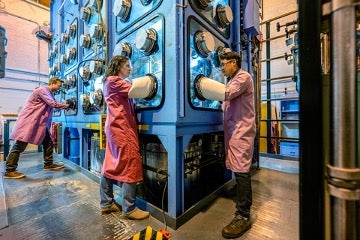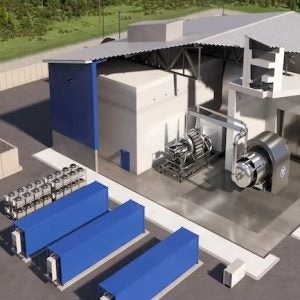
US-based Oklo has completed of the first end-to-end demonstration of the key stages of its advanced fuel recycling process, in collaboration with Argonne National Laboratory (ANL) and Idaho National Laboratory (INL). Oklo said this marks a significant step forward in its efforts to scale up its fuel recycling capabilities and deploy a commercial-scale recycling facility to increase advanced reactor fuel supplies, and enhance fuel cost effectiveness.
The project is supported by a $5m cost-share award from the Department of Energy’s (DOE’s) Advanced Research Projects Agency-Energy (ARPA-E) under the Optimising Nuclear Waste & Advanced Reactor Disposal Systems Program (ONWARDS Program). It aims to facilitate the deployment of a commercial-scale advanced fuel recycling facility.
“This milestone marks an important step forward in the team’s progress as they work towards economically viable nuclear fuel recycling.” said ARPA-E Director Evelyn N Wang. Oklo’s fuel recycling technology is engineered to extract over 90% of the remaining potential energy from used fuel. It incorporates unique proliferation-resistant features, including maintaining the consolidation of transuranic materials.
The introduction of commercial fuel recycling operations is also expected to save up to 80% on Oklo’s fuel costs, driving long-term value through enhanced fuel efficiency, alternative fuel source creation, and reduction in high-level waste requiring permanent disposal. “We recognise the inherent opportunity to enhance our mission through fuel recycling, converting used fuel into clean energy,” said Jacob DeWitte, co-founder and CEO of Oklo.
“Oklo’s use of fast fission technology positions us well to realise these fuel recycling benefits. The success of this project brings us closer to bringing a commercial-scale domestic fuel recycling facility online, crucial for strengthening our business model and advancing economic viability.”
Oklo is developing the Aurora microreactor, which uses heat pipes to transport heat from the reactor core to a supercritical carbon dioxide power conversion system to generate electricity. It will use HALEU fuel. Oklo says the reactor builds on the Experimental Breeder Reactor-II (EBR-II) and space reactor legacy. EBR-II features a hexagonal fuel element with a sealed heat pipe and a passive air-cooling system. Oklo initially marketed a 1.5 MWe microreactor version of the Aurora, but has now expanded its capacity offerings from 15 MWe to 100 MWe.
Oklo received a site permit in 2019 from DOE to build its first Aurora facility at INL. In 2020, Oklo submitted a combined licence application to the Nuclear Regulatory Commission (NRC) to build and operate the Aurora microreactor at INL. However, NRC denied the application, citing the company’s failure to provide sufficient design information. A revised application was submitted in September 2022.






